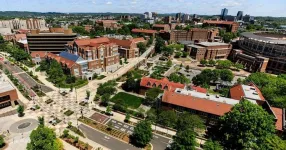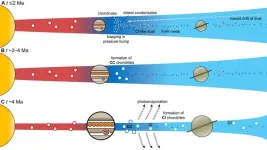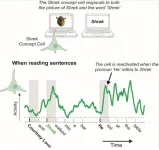(Press-News.org) PHILADELPHIA – Leading experts in radiation therapy from Penn Medicine’s Abramson Cancer Center and the Perelman School of Medicine will present new results from clinical trials and research studies at the American Society for Radiation Oncology's (ASTRO) 66th Annual Meeting, which will be held at the Walter E. Washington Convention Center in Washington, D.C., Sept. 29 through Oct. 2, 2024.
At the meeting, Neha Vapiwala, MD, FACR, FASTRO, FASCO, the Eli Glatstein Professor in Radiation Oncology, will take office as president-elect of ASTRO as the first Penn faculty member to lead the premier society for radiation oncology professionals. Her one-year term as president begins in fall 2025, followed by a year each as chair and immediate past chair of the Board of Directors.
In addition, Dimitris N. Mihailidis, PhD, an associate professor of Clinical Radiation Oncology, and Ying Xiao, PhD, a professor of Radiation Oncology, were named to the 2024 Class of ASTRO Fellows.
Expert interviews
Experts from Penn Medicine are available to comment on a wide range of radiation oncology research and care topics before, during, and after the meeting by video call, phone, or email. To arrange interviews, please contact Meagan Raeke at Meagan.Raeke@pennmedicine.upenn.edu or 267-693-6224.
Key presentations
Penn researchers will present clinical trial results, new data on FLASH radiation therapy, updates on expanding global access to radiation therapy, and more.
Data on global utilization and challenges in radiotherapy: As part of an International Session focused on a Lancet Oncology Commission toward bridging gaps in access, Surbhi Grover, MD, MPH, will give an overview on how stereotactic body radiotherapy (SBRT) is used across different regions of the world during the International 04 Session on Monday, Sept. 30 at 10:45 a.m. ET in Room 204.
Improvement in radiomic features following bridging therapy is prognostic for CAR T cell therapy outcome: This analysis looked at patients with large B-cell lymphoma who either received a bridging therapy (including systemic therapy, radiotherapy, or steroids) or no bridging therapy prior to CAR T cell therapy. They found that reduction in metabolic tumor volumes, measured by PET scans before and after bridging therapy, was associated with response to CAR T cell therapy, indicating that successful bridging therapy can improve CAR T cell therapy outcomes. Harper Hubbeling, MD, an assistant professor of Radiation Oncology, will present the findings during Scientific Session 18 on Monday, Sept. 30, at 10:45 a.m. ET in Room 144.
Phase II Study of radiation volume and dose de-intensification for throat cancer: Head and neck cancer treatment can impact a patient’s ability to swallow, speak, produce saliva, or other basic functions that significantly affect quality of life. After long-term follow-up (median 44 months) of a Penn-led clinical trial where patients with oropharyngeal squamous cell carcinoma received TransOral Robotic Surgery (TORS) followed by radiation therapy, researchers showed that the minimally invasive surgery combined with less-intense radiation therapy was able to control cancer growth with limited side effects. John Lukens, MD, will present the study results in Scientific Session 37 on Tuesday, Oct. 1 at 4 p.m. ET in Room 145.
FLASH proton radiotherapy on a model of cardiac disease: Penn Medicine is a leader in the development of FLASH therapy, which blasts tumors with an ultra-high dose of radiation in less than a second while sparing healthy tissues. This preclinical study, which compared FLASH to conventional proton therapy in mouse models of myocardial fibrosis, lays the groundwork for further exploration into FLASH proton radiotherapy as a potential treatment for thoracic malignancies. Ioannis Verginadis, PhD, a research assistant professor of Radiation Oncology, will present the findings in Scientific Session 42 on Wednesday, Oct. 2 at 8:00 a.m. in Room 143.
First canine treatment with a conformal proton flash delivery system: In the first clinical trial of its kind, Penn Medicine partnered with Penn’s School of Veterinary Medicine to treat pet dogs with the bone cancer osteosarcoma by using conformal FLASH proton radiotherapy. In conformal radiation, providers use CT scans to create three-dimensional maps of the tumor, something that’s common during standard radiation therapy, but had never been done before using FLASH. Eric Diffenderfer, PhD, an associate professor of Radiation Oncology, will share details of the first procedure in Scientific Session 43 on Wednesday, Oct. 2 at10:30 a.m. in Room 145.
###
Penn Medicine is one of the world’s leading academic medical centers, dedicated to the related missions of medical education, biomedical research, excellence in patient care, and community service. The organization consists of the University of Pennsylvania Health System and Penn’s Raymond and Ruth Perelman School of Medicine, founded in 1765 as the nation’s first medical school.
The Perelman School of Medicine is consistently among the nation's top recipients of funding from the National Institutes of Health, with $550 million awarded in the 2022 fiscal year. Home to a proud history of “firsts” in medicine, Penn Medicine teams have pioneered discoveries and innovations that have shaped modern medicine, including recent breakthroughs such as CAR T cell therapy for cancer and the mRNA technology used in COVID-19 vaccines.
The University of Pennsylvania Health System’s patient care facilities stretch from the Susquehanna River in Pennsylvania to the New Jersey shore. These include the Hospital of the University of Pennsylvania, Penn Presbyterian Medical Center, Chester County Hospital, Lancaster General Health, Penn Medicine Princeton Health, and Pennsylvania Hospital—the nation’s first hospital, founded in 1751. Additional facilities and enterprises include Good Shepherd Penn Partners, Penn Medicine at Home, Lancaster Behavioral Health Hospital, and Princeton House Behavioral Health, among others.
Penn Medicine is an $11.1 billion enterprise powered by more than 49,000 talented faculty and staff.
END
University of Cincinnati Cancer Center experts will present research at the American Society for Radiation Oncology (ASTRO) Annual Meeting Sept. 29 through Oct. 2.
Osteoradionecrosis more common in patients with head and neck cancer that requires partial jaw removal
Following radiation treatment for head and neck cancer, some patients can experience osteoradionecrosis (ORN) when an area of exposed bone fails to heal after a three-month period.
“ORN of the mandible and maxilla (jaw bones) can be very debilitating, as it often causes severe pain, fistula formation, infection and susceptibility to fractures,” ...
Center for BrainHealth® at The University of Texas at Dallas has received a major match gift commitment from retired U.S. Navy four-star admiral and former University of Texas System chancellor William McRaven and his wife Georgeann. Adm. McRaven recently received the 2024 Bezos Courage & Civility Award presented by Amazon founder Jeff Bezos and Lauren Sánchez.
The $2 million challenge grant will support Optimal BrainHealth for Warfighters – including active-duty military, spouses and veterans. This program will help those with traumatic brain injury (TBI), post-traumatic stress (PTS) and similar issues, as well ...
Irvine, Calif., Sept. 27, 2024 — Research from the University of California, Irvine has revealed how disruption of the circadian clock, the body’s internal, 24-hour biological pacemaker, may accelerate the progression of colorectal cancer by affecting the gut microbiome and intestinal barrier function. This discovery offers new avenues for prevention and treatment strategies.
The study, published online today in the journal Science Advances, offers a more comprehensive understanding of how important changes occur in the function and composition of the gut microbiome when the circadian clock is disturbed in the presence ...
The University of Tennessee and the UT Institute of Agriculture have received a $434,038 Seeding Solutions grant from the Foundation for Food & Agriculture Research (FFAR) to develop and test a decision support tool for farmers to better manage crop production from risks of extreme weather events across the Tennessee River Basin and surrounding southeast US regions.
UT is providing matching funds for a total investment of $966,119 over the three-year project.
The U.S. Department of Agriculture estimates that extreme weather is responsible for 90% of crop losses. These estimates are generally based on annual climate conditions. ...
Researchers from three of Virginia’s premier universities, including the University of Virginia’s Homa Alemzadeh, aim to take the risk out of self-driving vehicles by overcoming inevitable computer failures with good engineering.
The trio will share a $926,737 National Science Foundation award to identify when and where autonomous vehicle systems are most vulnerable to safety-critical failures. They plan to use this knowledge to design ways to efficiently mitigate potential safety hazards and enhance the overall system resilience.
Alemzadeh, an associate professor of electrical and computer engineering in UVA’s School of Engineering and Applied ...
Since the first sighting of the first-discovered and largest asteroid in our solar system was made in 1801 by Giuseppe Piazzi, astronomers and planetary scientists have pondered the make-up of this asteroid/dwarf planet. Its heavily battered and dimpled surface is covered in impact craters. Scientists have long argued that visible craters on the surface meant that Ceres could not be very icy.
Researchers at Purdue University and the NASA's Jet Propulsion Lab (JPL) now believe Ceres is a very icy ...
Researchers with McMaster University have discovered that the protein mutated in patients with Huntington’s Disease doesn't repair DNA as intended, impacting the ability of brain cells to heal themselves.
The research, published in PNAS on Sept. 27, 2024, found that the huntingtin protein helps create special molecules that are important for fixing DNA damage. These molecules, known as Poly [ADP-ribose] (PAR), gather around damaged DNA and, like a net, pull in all the factors needed for the repair process.
In people with Huntington’s Disease, however, the research found that the mutated version of this protein doesn’t function properly ...
DURHAM, N.C. – Estrogens are known to drive tumor growth in breast cancer cells that carry its receptors, but a new study by Duke Cancer Institute researchers unexpectedly finds that estrogens play a role in fueling the growth of breast cancers without the receptors, as well as numerous other cancers.
Appearing Sept. 27 in the journal Science Advances, the researchers describe how estrogens not only decrease the ability of the immune system to attack tumors, but also reduce the effectiveness of immunotherapies that are used to treat many cancers, notably triple-negative breast cancers. Triple-negative ...
In December 2020 the space probe Hayabusa 2 brought samples of asteroid Ryugu back to Earth. Since then, the few grams of material have been through quite a lot. After initial examinations in Japan, some of the tiny, jet-black grains traveled to research facilities around the world. There they were measured, weighed, chemically analyzed and exposed to infrared, X-ray and synchroton radiation, among other things. At the MPS, researchers examine the ratios of certain metal isotopes in the samples, as in the current study. Scientists refer to isotopes as variants of the same element that differ only in the number of neutrons in the nucleus. Investigations ...
A new study shows how individual brain cells in the hippocampus respond to pronouns. “This may help us unravel how we remember what we read.”
Read the following sentence: “Donald Trump and Kamala Harris walked into the bar, she sat down at a table.” We all immediately know that it was Kamala who sat at the table, not Donald. Pronouns like “she” help us to understand language, but pronouns can have multiple meanings. Depending on the context, we understand who the pronoun is referring to. But ...




